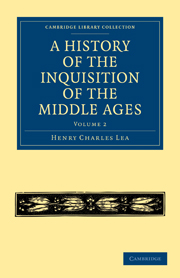CHAPTER III - THE SPANISH PENINSULA
Published online by Cambridge University Press: 29 August 2010
Summary
The kingdom of Aragon, stretching across both sides of the Pyrenees, with a population kindred in blood and speech to that of Mediterranean France, was particularly liable to inroads of heresy from the latter. The Counts of Barcelona had been Carlovingian vassals, and even owned a shadowy allegiance to the first Capetians. We have seen how ready were Pedro II. and his successors to aid in resisting Frankish encroachments, even at the cost of encouraging heresy, and it was inevitable that schismatic missions should be established in populous centres such as Barcelona, and that heretics, when hard-pressed, should seek refuge in the mountains of Cerdaña and Urgel. In spite of this, however, heresy never obtained to the west of the Pyrenees the foothold which it enjoyed to the east. Its manifestations there were only spasmodic, and were suppressed with effort comparatively slender.
It is somewhat remarkable that we hear nothing specifically of the Cathari in Aragon proper. Matthew Paris, indeed, tells a wild tale of how, in 1234, they were so numerous in the parts of Spain that they decreed the abrogation of Christianity, and raised a large army with which they burned churches and spared neither age nor sex, until Gregory IX. ordered a crusade against them throughout western Europe, when in a stricken field they were all cut off to a man; but this may safely be set down to the imagination of some pilgrim returning from Compostella and desiring to repay a night's hospitality at St. Alban's. In the enumeration of Eainerio Saccone, about 1250, there is no mention of any Catharan organization west of the Pyrenees.
- Type
- Chapter
- Information
- A History of the Inquisition of the Middle Ages , pp. 162 - 190Publisher: Cambridge University PressPrint publication year: 2010First published in: 1888



